- Home
- Andrew Wareham
Illusions Of Change (A Poor Man at the Gate Series Book 6) Page 2
Illusions Of Change (A Poor Man at the Gate Series Book 6) Read online
Page 2
Michael closed the folder, tying its ribbon neatly and tidily. He saw the blank expression on Tom’s face.
“Ah, tonics, my lord. A basis of about a quarter of the bottle of distilled spirits, my lord, the alcohol disguised by the careful admixture of a strong flavouring matter, garlic much used - such a healthy taste, of course - diluted with clean, boiled water, and then not less than twenty parts by volume of opium. Laudanum in disguise, my lord, nepenthe, one might say. An excellent tonic for a good night’s sleep. Every night, of course.”
Habit forming and therefore a source of an income for life. A foreshortened life, perhaps, but a much more comfortable, happy one, with such pleasant dreams.
“Not hugely expensive, my lord. Ten pence or perhaps a shilling for a week’s supply, the glass bottle refilled discreetly at the apothecary’s so that there is no evidence to be seen on the rubbish heap, one container lasting for years. A housewife in her forties and starting to discover certain discomforts will enjoy a far easier existence courtesy of her medicinal compound.”
“Is it as much a commonplace as you imply, Mr Michael?”
“I suspect that every woman of an age in the country who can find an extra shilling in the housekeeping puts it to medicinal use, my lord.”
“Indian opium?”
“Of course, my lord. Every East Indiaman making port in London will have some chests aboard. Although I must add that I believe some of the Levanters also bring supplies from Persia, though certainly not in such quantities as John Company sends. We must console ourselves with the thought that it is probably less harmful than gin, though not so cheap.”
Tom shrugged, it was not his problem, he had no duty to save women from their own foolishness; if they wished to become opium-eaters then the choice, and the penalty, was theirs.
“Is the widow Amberley still alive, do you know?”
“I think not, my lord. She was in poor health when last I had word of her.”
“So… Two aunts and an uncle and that is all. They might well wish to become acquainted with a land-owning nephew, his late mother having been so fortunate as to wed Mr Burley, of course. One must ask, even so, whether they would do him any credit. His wife’s people might well look askance at mere shopkeepers.”
Michael agreed, better to leave those dogs asleep, he felt.
“I am off to Dorset with Lady Andrews, Mr Michael, so I suspect this is where we say farewell. You have done very well by me over the years, Mr Michael, and I owe you thanks. Will you remain in contact with Mr Smith, by the way?”
“My son will do so, my lord. All is in hand there.”
The connection was very useful; it was always as well to keep in with some of the government’s less visible servants.
“Lord Star’s son was very pleased to have been released from the entanglement he had so unfortunately entered into. He has come to realise that he had acted carelessly and I am very sure he will never be so thoughtless again. He knows now that he is to an extent a public man and he must organise his private life appropriately.”
Michael smiled benignly – an unalloyed success, one he was proud of.
“He has a shining career in front of him, my lord. There is a need to increase the strength of the bench, my lord, in numbers, primarily so as to reduce the delays in criminal matters. Government has noticed, finally, that felons may be taken up with much acclaim but then wait on remand for two or even three years so that they have been forgotten by the great mass of people when eventually they are brought to book for their crimes. There is little deterrent effect in hanging a nonentity, which is what they will have become, locked away out of sight and mind. Mr Star will be invited to become a puisne judge later this year, one understands.”
“Very young!”
“Indeed, my lord. One is given to understand that government is not unaware of Mr Star’s background and wishes to, shall we say, please his familial connections.”
Plural, Tom noted. Not just his father. That must mean a desire to keep Thomas Star sweet. The young man did not wish to leave the provinces, to become a member of the government and spend most of the year in London as even a junior Minister of the Crown must, so it was difficult to reward him directly. Joe Star had mentioned that Thomas was becoming active locally, and government must have noted and approved of his doings.
Government favour could be quite useful in a year or two. Charlie would like to be Lady Star, so a baronetcy for Matthew would be a worthwhile aim. ‘Distinguished naval service’ together with his work in the biggest of new steam shipyards, they should be helpful. What else? A bit of philanthropy would come in handy – what had he been saying the last time they had met?
Tom cast his mind back a few weeks – the problems of seamen officers and engineer officers, that was it, the new ships needing new ways of working at sea. Unspoken, but clearly in Matthew’s mind, was the concern that engineer, steam hold, officers would commonly not be gentlemen, whilst deck officers certainly would continue to be. It would be difficult to persuade the middle order of people to send their sons into the grime and vulgarity of a coal-fired career, so Matthew thought. He was probably right.
Such being the case, the steam ships should recruit their engineer officers from a new source. The orphanages could be persuaded, very easily, to give of their brightest and best boys to become steam apprentices. Their keep and clothing and education paid for them in a dockside school until they were, say, fourteen years of age, then three or four years sea-going in the engine rooms on a low wage, rations and a uniform still provided, and then they could be declared to be officers, though not gentlemen. A hundred boys a year at least, the cost would not be too high and there would be thousands of small steamers in the coastal waters before five years were past, and many hundreds of larger within the decade, and all needing skilled men.
Considering the idea, Tom concluded that it did actually make good sense, was more than simply a way of twisting the politicians’ arms.
He wrote a letter to Matthew.
“First thing tomorrow, my dear. What route does your father habitually use for the journey? My roadbook shows no direct set of highways.”
Frances gave a moue of distaste.
“There is no direct route, Thomas. Guildford, Alton, Winchester on the first day of travel, provided it is not raining. Then to Romsey, Christchurch and Poole, again only as long as the weather is dry. The third day takes us to Dorchester and to the estate, and may be a long, slow crawl because there is hardly any made road at all, as we discovered after the wedding. With four horses and changing frequently it need not be too slow a journey, though my parsimonious brother will generally take a week with just his own pair, and easy stages.”
They set off soon after dawn, two chaises in convoy, valet and maid luxuriating in the second, it being quite ineligible that the servants should sit next to master and mistress. The bulk of their baggage had been sent off four days before by wagon, might be expected to reach the Payntons at much the same time as they did.
“Where there is no turnpike travel is almost impossible, Thomas. Difficult for us, prohibitive for the poor. We need these new steam carriages on trackways that Joseph seems so certain must eventuate.”
“Or larger steam ships to use our long coastline to greater effect.”
Frances tended to be seasick, had little use for the concept of regular sea travel.
“Sea faring will hardly be practical in winter, or during the autumn gales, Thomas. Would it not be possible to extend the turnpikes into a system connecting every major town?”
“Cost! Turnpikes are toll roads, and not cheap, especially for wagons which are charged higher for cutting up the surface more. Government could build military roads, but the taxpayer would howl. The villain Bonaparte built roads, not having to answer to his citizens except with a bullet if they shouted too loudly, but I doubt we would wish to follow his example. No, we must wait for the steam trackways if we are to have inland transport, my dear.”
The morning was dry and they reached Guildford in good time, set out hopefully on the road west to Alton, a little more than twenty miles, barely three hours if the sun shone. It came on to rain and they actually reached their post house nearly five cold hours later, the carriage splashed in mud to its roof, the crest on the doors quite invisible, Brown having to nudge the ostlers into action. The valet was rather upset that the landlord was not to be seen, bent low in his welcome. It took no more than two minutes to remedy the informality of their greeting, to let it be known that these were no mere travellers to be dumped offhand into the nearest bedchamber.
“Private parlour, my lord, my lady, just one moment while the fire is lit. Polly, Chambers One and Two for my lord, quickly, girl.”
“We did give Number One to that Mr Rogers, acos you said there weren’t goin’ to be nobody comin’ on a night like this!”
“Throw ‘im out! And if ‘e complains put the bugger down the street to the Sun!”
Tom and Frances very carefully did not hear any of the whispered asides, they were not meant for their ears.
“A glass of something warming, my lord, ma’am?”
“Just coffee, if you please.”
The landlord ran into the kitchen himself to call for a pot, took the opportunity to tell cook to get herself together and knock up something fit for Quality as well as the Ordinary.
“Baked ham, my lord, a shoulder of lamb, a pair of capons?”
They agreed the menu would be satisfactory, were ushered to their rooms, made habitable by their own people, changed out of their stale travelling clothes.
“Will we be able to make Christchurch or Poole tomorrow, landlord?”
“Not Poole, my lord. Maybe Christchurch, if the rain stops before midnight. Lyndhurst is a better bet, I would say, acos that road through the Forest ain’t so good as it might be, except in high summer, which this ain’t yet, this year, not by a long way.”
It rained all night, and most of the next day. They reached the Payntons after five days of tedious travel, not quite in the way of enduring Gervase Drew and his dull pomposity. Courtesy demanded that they should smile, however.
“How does it come about that a man of your father’s wit and intelligence should produce so completely pedestrian a son, Frances? And I do not, I would add, lay blame upon your mother, a charmingly competent lady!”
Frances had no answer, though she had often pondered the question. She did not believe in fairies and thus could not venture the supposition that he might be a changeling, but she had no more likely alternative to offer.
They changed for dinner and returned to the public rooms of the house, entering shoulder by shoulder in an aggressive statement of emancipation, or so Gervase presumed. He would far rather have seen his sister a pace behind her lord and master, it would have been more proper. He wondered that his mother did not take her aside for a quiet word of rebuke, but felt that he should not do so himself.
The Andrews had brought a London newspaper with them, the news barely a week old and far more fresh than was usual in deepest Dorset.
“What do you think of this business in Manchester, my lord? There seems to be a great fuss over the deaths of a few of the ill-conditioned! One might have expected the authorities to be applauding the Yeomanry for their resolute action!”
Frances drew a deep breath, preparing to calm her husband. Lord Paynton readied himself to smooth his son’s ruffled feathers, fully expecting Tom to dissect his character and then stamp on the shreds. Tom drew himself up to his full height, then shook his head, let his face show that it was not worthwhile to become angry.
“I received a letter on the day before we set out, Mr Drew. From my old friend and partner, Lord Star, a Lancashire man, as you may know. He keeps himself well informed and his eldest son, Mr Thomas Star, is increasingly active in public matters and so has the ear of the magistrates and of the Sheriff’s office.”
Gervase had never heard of Lord Star, or his son.
“A large crowd, but peaceful, Lord Star informs me. Certainly being addressed by Mr Hunt, who is a Radical and tends towards the seditious in his speech. The audience was unarmed and contained very many women and children, thus showing, I think, that no violence was planned. One might well argue that so many tens of thousands massed together presented a risk of disorder, and the magistrates seemed to have believed so. Be that as it may, the authorities ordered the crowd to be dispersed and the military interpreted the order as license to use extreme force. The Yeomanry were the worse for liquor, it would seem, certainly some of their officers were wholly drunk. One at least of their captains had been named by a judge of the High Court of Justice as a drunken brute in a previous year.”
Gervase was taken aback – he deplored intoxication as a matter of principle, could not conceive that an officer could be taken by drink in the course of his duties.
“The Yeomanry charged, using the edge of their blades, and at least seventeen of the crowd at St Peter’s Fields died, ten or eleven at the scene and more in the hours immediately after. Seven of the dead were women, dressed in skirts, one would add, not in any disguise, and selected quite deliberately according to some witnesses.”
Gervase was appalled – it was obvious that the witnesses must be lying; he could not imagine how they could have been persuaded to perjure themselves.
“It is all very sad, my lord, and one must deplore any loss of life, yet it must be said that had they not indulged in an unlawful assembly then they could never have put their lives at risk.”
Lord Paynton offered wine at this point, he had picked up a couple of dozens of a very good Burgundy, he said, that they might wish to try. Gervase pointed out that Burgundy was not an appropriate glass before dinner but his father hushed him and his mother and sister talked him down so that he fell into offended silence, next to his wife who had not raised her voice in any case.
The topic was entered upon again as the men sat over their port, it could hardly be ignored.
“What will government do, Lord Andrews? Have you heard any word in Town?”
“Sidmouth is demanding a set of six oppressive Acts designed to silence all political dissent. He has a sufficiency of support that Liverpool has given way and will let them be passed, but the word is that the authorities in the counties and boroughs have already been informed that the new laws shall be no more than an army of reserve, not to be used except in the direst need, and not without prior approval from Ministers of the Crown. Opinion in the Cabinet is such that it is unlikely that the new Acts would be given effect in any situation short of open civil war. The national newssheets are much outraged by St Peter’s Fields – some have named it ‘Peterloo’, indeed, so exercised are they by the massacre. It should not be forgotten that they are becoming influential in creating a mood amongst the County electors.”
The County members did not represent any majority in Parliament and could not themselves change a government, but they had a degree of moral superiority inasmuch that they had been freely voted for by a significant proportion of people with a financial stake in the nation. Any Prime Minister who wished to lead his country had to take note of the feelings of the County members and Liverpool, for all his faults, was generally agreed to be no tyrant.
“Prinny, by the way, is much upset by the bloodshed. He does not understand all of the issues but he is not in favour of letting Cossacks loose on English streets.”
They agreed that this was probably the first good thing they had ever heard of the man. They commented that they expected it would also be the last.
Gervase was shocked, could not comprehend their apparent disloyalty to the king-to-be. His father acquainted him with the gossip, and he was even more shocked.
Later, over a final glass before retiring, the two peers spoke very quietly together.
“Will it be civil war, at last, Lord Andrews?”
“Not from all I hear, my lord. Too many men of influence are too angry that a
drunken Militia should have been let loose on the crowds. The word is, in fact, that many of the junior officers were no more than Volunteers, untrained and inexperienced even as Militia, mill-owners’ sons, drunken layabouts of small brain and less integrity and utterly without character. I believe that Peel may well be seen as a wise man when he calls for a police force rather than the military to exercise authority over the people.”
“Do we want policemen poking their noses into the business of their betters?”
“They won’t! Like every other man of sense, they will do as they are told by those who have money and power. Police are for the ninety percent of the population who lack the money or influence to bribe them.”
“With the right sort of people put in charge of them, their local colonels or whatever they may be called, you will certainly be correct. What of the newssheets? You say they are forming public opinion to some extent.”
“Buy them! Encourage them to be free, untrammelled, wholly at liberty to publish what they will. Just make sure that the men who pay their wages think in the right way. I will bring Robert to your attention when we are next in London and he may describe his experience of America where the papers are more developed.”
They inspected the estate, as was incumbent upon them as landholders themselves, discussed drainage at tedious length, made approving noises at the new bull, shook their heads at the ancient, single-share ploughs.
“You should buy iron ploughs, Mr Drew. These soils are light enough to take a double share behind a single great horse and where you would have taken ten days to plough a field you will now need only six. Is that rye stubble I see over there?”

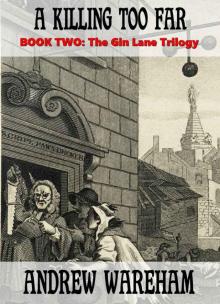 A Killing Too Far
A Killing Too Far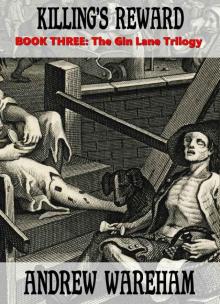 Killing's Reward
Killing's Reward A New Place
A New Place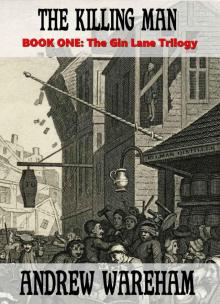 The Killing Man
The Killing Man Bold and Blooded
Bold and Blooded The Breaking Storm (Innocent No More Series, Book 2)
The Breaking Storm (Innocent No More Series, Book 2) Nobody’s Child
Nobody’s Child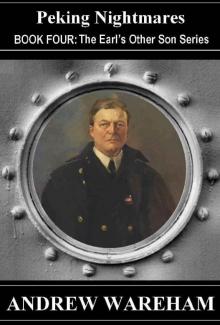 04 Peking Nightmares (The Earl’s Other Son Series, #4)
04 Peking Nightmares (The Earl’s Other Son Series, #4)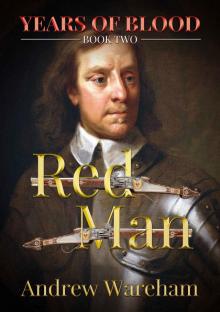 Red Man
Red Man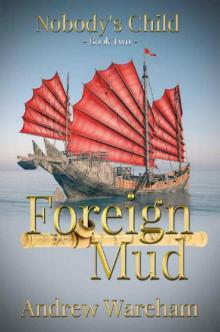 Foreign Mud
Foreign Mud The Gathering Clouds (Innocent No More Series, Book 1)
The Gathering Clouds (Innocent No More Series, Book 1) 06 A Soldier’s Farewell (Man of Conflict #6)
06 A Soldier’s Farewell (Man of Conflict #6)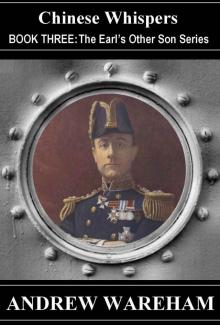 Chinese Whispers
Chinese Whispers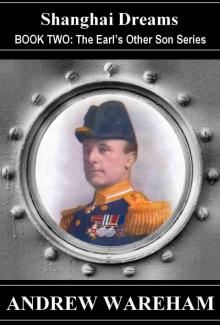 02 Shanghai Dreams (The Earl’s Other Son #2)
02 Shanghai Dreams (The Earl’s Other Son #2)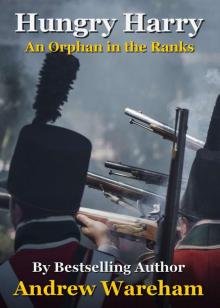 Hungry Harry: An Orphan in the Ranks
Hungry Harry: An Orphan in the Ranks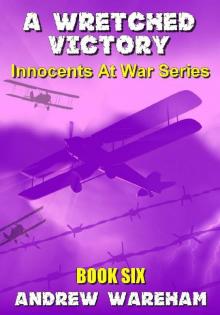 A Wretched Victory (Innocents At War Series, Book 6)
A Wretched Victory (Innocents At War Series, Book 6)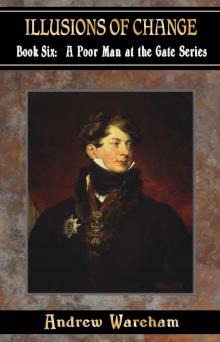 Illusions Of Change (A Poor Man at the Gate Series Book 6)
Illusions Of Change (A Poor Man at the Gate Series Book 6)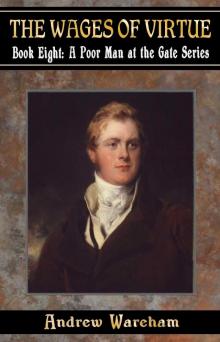 The Wages Of Virtue (A Poor Man at the Gate Series, Book 8)
The Wages Of Virtue (A Poor Man at the Gate Series, Book 8) Blood and Famine (Man of Conflict Series, Book 4)
Blood and Famine (Man of Conflict Series, Book 4)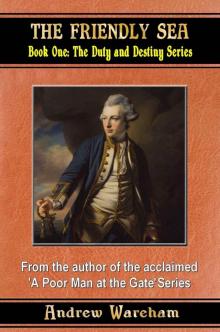 The Friendly Sea (The Duty and Destiny Series, Book 1)
The Friendly Sea (The Duty and Destiny Series, Book 1)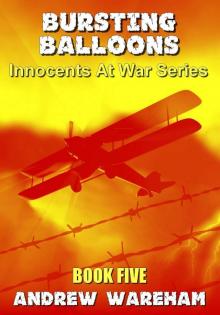 Bursting Balloons (Innocents At War Series, Book 5)
Bursting Balloons (Innocents At War Series, Book 5)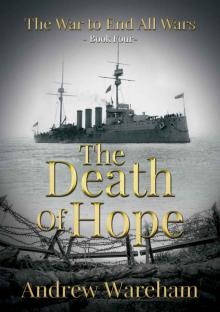 The Death of Hope
The Death of Hope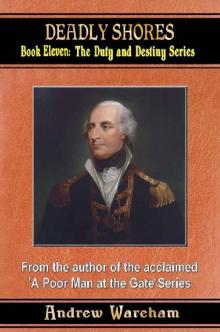 Deadly Shores (The Duty and Destiny Series, Book 11)
Deadly Shores (The Duty and Destiny Series, Book 11)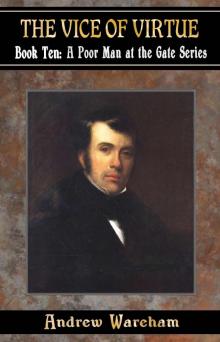 The Vice Of Virtue (A Poor Man At The Gate Series Book 10)
The Vice Of Virtue (A Poor Man At The Gate Series Book 10)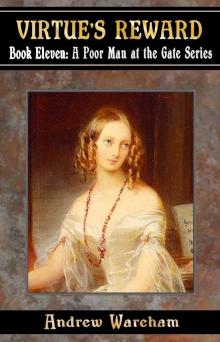 Virtue’s Reward (A Poor Man at the Gate Series, Book 11)
Virtue’s Reward (A Poor Man at the Gate Series, Book 11)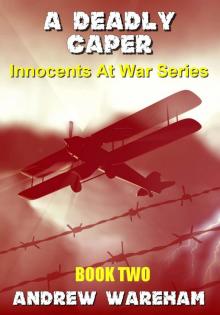 A Deadly Caper (Innocents At War Series, Book 2)
A Deadly Caper (Innocents At War Series, Book 2)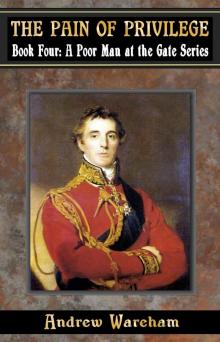 The Pain Of Privilege (A Poor Man at the Gate Series Book 4)
The Pain Of Privilege (A Poor Man at the Gate Series Book 4)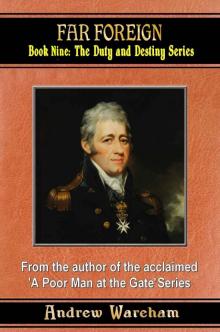 Far Foreign (The Duty and Destiny Series, Book 9)
Far Foreign (The Duty and Destiny Series, Book 9)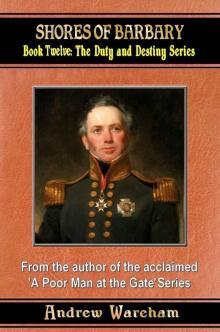 Shores of Barbary (The Duty and Destiny Series, Book 12)
Shores of Barbary (The Duty and Destiny Series, Book 12)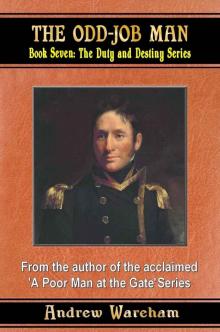 The Odd-Job Man (The Duty and Destiny Series, Book 7)
The Odd-Job Man (The Duty and Destiny Series, Book 7) Fire and Folly (Man of Conflict Series Book 3)
Fire and Folly (Man of Conflict Series Book 3)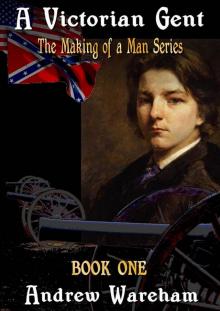 A Victorian Gent (The Making of a Man Series, Book 1)
A Victorian Gent (The Making of a Man Series, Book 1)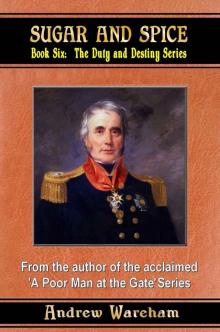 Sugar and Spice (The Duty and Destiny Series, Book 6)
Sugar and Spice (The Duty and Destiny Series, Book 6)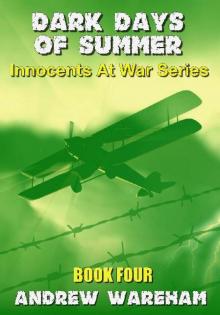 Dark Days Of Summer (Innocents At War Series, Book 4)
Dark Days Of Summer (Innocents At War Series, Book 4)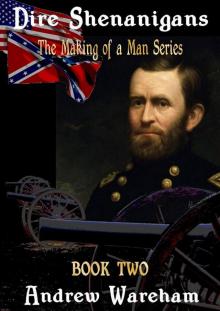 Dire Shenanigans (The Making of a Man Series, Book 2)
Dire Shenanigans (The Making of a Man Series, Book 2)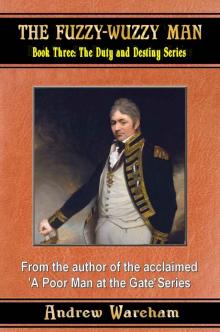 The Fuzzy-Wuzzy Man (The Duty and Destiny Series, Book 3)
The Fuzzy-Wuzzy Man (The Duty and Destiny Series, Book 3)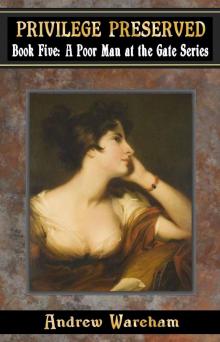 Privilege Preserved (A Poor Man at the Gate Series Book 5)
Privilege Preserved (A Poor Man at the Gate Series Book 5)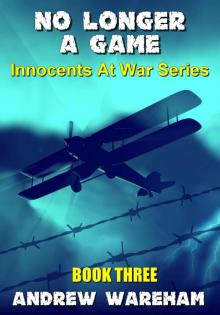 No Longer A Game (Innocents At War Series, Book 3)
No Longer A Game (Innocents At War Series, Book 3)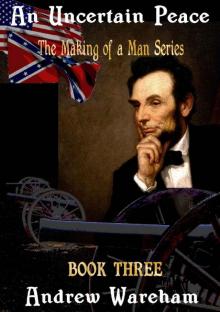 An Uncertain Peace (The Making of a Man Series, Book 3)
An Uncertain Peace (The Making of a Man Series, Book 3)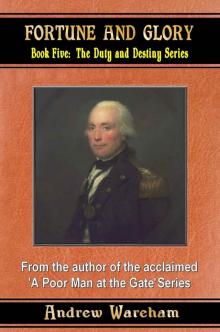 Fortune And Glory (The Duty and Destiny Series, Book 5)
Fortune And Glory (The Duty and Destiny Series, Book 5)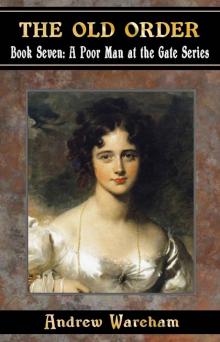 The Old Order (A Poor Man at the Gate Series Book 7)
The Old Order (A Poor Man at the Gate Series Book 7) A Place Called Home (Cannibal Country Trilogy, Book 2)
A Place Called Home (Cannibal Country Trilogy, Book 2)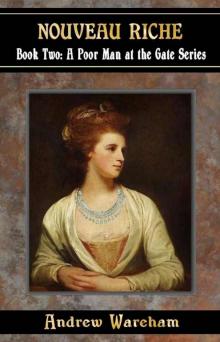 Nouveau Riche (A Poor Man at the Gate Series, Book 2)
Nouveau Riche (A Poor Man at the Gate Series, Book 2)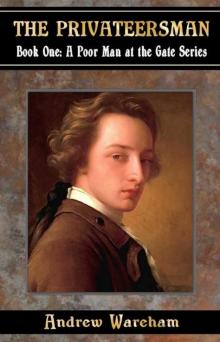 The Privateersman (A Poor Man at the Gate Series Book 1)
The Privateersman (A Poor Man at the Gate Series Book 1)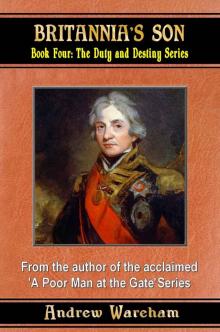 Britannia’s Son (The Duty and Destiny Series, Book 4)
Britannia’s Son (The Duty and Destiny Series, Book 4) Long Way Place (Cannibal Country Trilogy, Book 1)
Long Way Place (Cannibal Country Trilogy, Book 1) Spanish Tricks (Man of Conflict Series, Book 5)
Spanish Tricks (Man of Conflict Series, Book 5)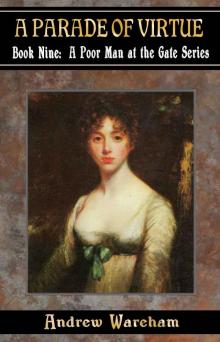 A Parade Of Virtue (A Poor Man At The Gate Series Book 9)
A Parade Of Virtue (A Poor Man At The Gate Series Book 9)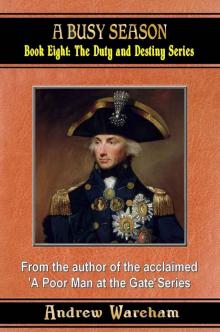 A Busy Season (The Duty and Destiny Series, Book 8)
A Busy Season (The Duty and Destiny Series, Book 8) Billy Bacon and the Soldier Slaves (Colonial Warrior Series, Book 1)
Billy Bacon and the Soldier Slaves (Colonial Warrior Series, Book 1) Raging Rajahs (Man of Conflict Series, Book 2)
Raging Rajahs (Man of Conflict Series, Book 2)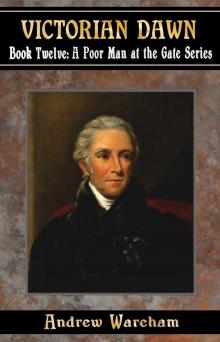 Victorian Dawn (A Poor Man at the Gate Series, Book 12)
Victorian Dawn (A Poor Man at the Gate Series, Book 12)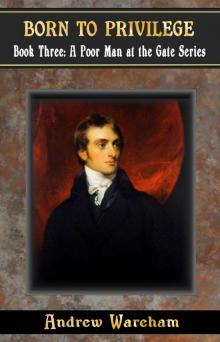 Born To Privilege (A Poor Man at the Gate Series Book 3)
Born To Privilege (A Poor Man at the Gate Series Book 3)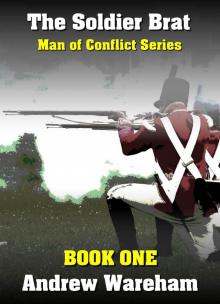 The Soldier Brat (Man of Conflict Series, Book 1)
The Soldier Brat (Man of Conflict Series, Book 1)